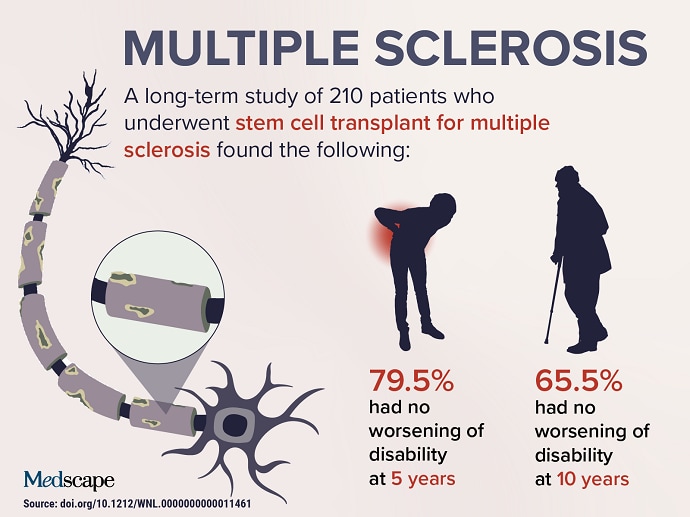Trending Clinical Topic: Multiple Sclerosis
Each week, we identify one top search term, speculate about what caused its popularity, and provide an infographic on a related condition. If you have thoughts about what's trending and why, share them with us on Twitter or Facebook. Find the latest COVID-19 news and guidance in Medscape's Coronavirus Resource Center.
An actress's announcement that she is in remission from multiple sclerosis (MS), along with significant new treatment research, resulted in this week's top trending clinical topic. Selma Blair, 49, who was diagnosed with MS in 2018, announced that her "aggressive" treatment strategy was successful. After years of dealing with a serious flare, during which she had difficulty speaking and lost the ability to fully use her left leg, Blair said, "Stem cell [transplantation] put me in remission."
A study examining autologous hematopoietic stem cell transplantation among patients with MS found long-lasting benefits (see Infographic below). Patients with relapsing-remitting MS (RRMS) had better results than those with other forms, with 85.5% experiencing no worsening of disability at 5 years, and 71.3% at 10 years. Among patients with progressive MS, 71% had no worsening of disability at 5 years, and 57.2% at 10 years. Study author Matilde Inglese, MD, PhD, stated, "The best patient candidates for this procedure are those with highly active multiple sclerosis who are not responsive to high-efficacy drugs such as alemtuzumab or ocrelizumab."
The choice of treatment in patients with MS may be even more significant than first thought. The lifetime prevalence of depression in this group is approximately 50%. New research found that patients who used rituximab off-label to treat RRMS had a 28% lower risk for depression than those who used interferons. The study included nearly 4000 patients from the Swedish MS Registry. The median time between disease-modifying therapy start and discontinuation was 1.81 years. The risk for discontinuing interferons was higher among patients with depression vs without.
A less expensive, more convenient treatment option may soon be available. Results from two new phase 3 trials showed that ublituximab, a novel glycoengineered anti-CD20 monoclonal antibody, significantly reduced the annualized relapse rate (ARR) and MRI parameters compared with teriflunomide in patients with relapsing forms of MS. For the ULTIMATE I study, the primary outcome was AAR. Results showed that this rate was 0.076 for the ublituximab group and 0.188 for the teriflunomide group, resulting in a 60% relative reduction. In ULTIMATE II, the ARR was 0.091 for ublituximab and 0.178 for teriflunomide, for a relative reduction of 49%. The findings were presented at the virtual Congress of the European Academy of Neurology 2021. Two anti-CD20 agents are currently approved by the US Food and Drug Administration for MS; both require 4-hour infusions.
A separate study examined the relationship between pediatric MS and other autoimmune disorders. Rates of those diseases, including ones affecting the thyroid, were higher among families with individuals who had pediatric MS. This finding "reinforces the fact that there are probably overlapping genetic risk factors for autoimmunity in general, but the specific autoimmune disease a person gets is based on exposures over time," lead author Benjamin M. Greenberg, MD, told Medscape. In unadjusted analyses, the prevalence of a family history of autoimmune disease was significantly higher among children with MS compared with their healthy peers (68.1% vs 49.5%). Conditions for which prevalences were significantly higher among the case group vs the control group were childhood-onset diabetes (6.3% vs 2.7%), adult-onset diabetes (44.6% vs 29.8%), thyroid disorders (20% vs 13.4%), rheumatoid arthritis (15.6% vs 9.25%), MS in non–first-degree relatives (13.7% vs 4.1%), and systemic lupus erythematosus (5.7% vs 3.1%).
Thanks to positive news about remission achieved through stem cell transplant as well as other treatment developments, plus potentially concerning research regarding an association with other disorders, multiple sclerosis was this week's top trending clinical topic.
